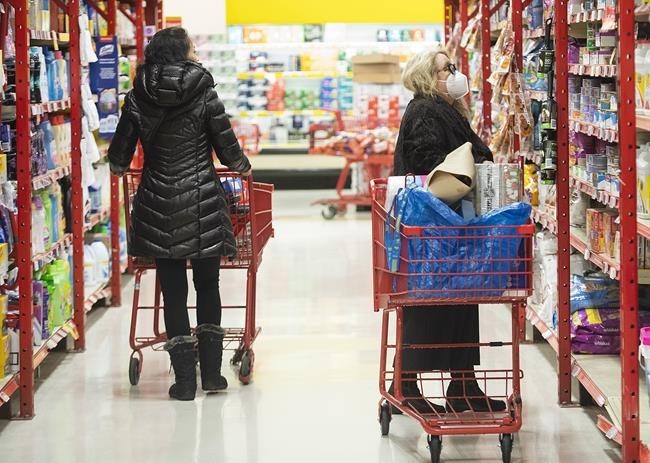More competition is needed in sa国际传媒’s grocery sector as consumers grapple with higher food prices, said Finance Minister Chrystia Freeland, after two of the country's largest grocers reported higher sales and profits in the most recent quarter.
Speaking at a press conference in Mascouche, Que., Freeland said major changes need to be made to Canadian competition law in order to help stabilize food prices.
"We need to bring more competition into the Canadian economy, particularly in the grocery sector," she said.
"We are prepared to use every tool in our toolbox, including tax policy, to make sure that prices stabilize."
Freeland's comments Wednesday came on the heels of financial results from Loblaw Companies Ltd. and Metro Inc.
Loblaw reported a profit for the third quarter of $621 million, up from $556 million during the same quarter last year. Revenues for the quarter rose to $18.27 billion, up from $17.39 billion.
Meanwhile, Metro saw profit for its fourth quarter rise to $222.2 million, up from $168.7 million a year earlier, while sales were $5.07 billion, up from $4.43 billion last year.
As Canadians increasingly look to save on food costs, Loblaw and Metro said they’ve been converting stores to discount banners and are seeing higher sales growth in private-label brands.
"Our Maxi and No Frills stores led the way, generating double-digit growth again this quarter," chairman Galen Weston said on a conference call with analysts. The company has plans for more new and converted discount stores next year, he said.
The price of groceries has been one of the sharpest thorns in Canadians' sides amid a broader swell of inflation that peaked last summer.
Inflation has since eased under the weight of interest rate increases from the Bank of sa国际传媒, but many Canadians are still grappling with an overall higher cost of living, including rent, mortgage payments and grocery bills.
On Tuesday, Statistics sa国际传媒 said nearly seven million Canadians struggled with hunger last year. The proportion of families in sa国际传媒 that reported experiencing food insecurity within the previous 12 months rose 16 per cent between 2021 and 2022.
This fall, the federal government called upon the major grocers to take steps to stabilize food prices and, last month, Industry Minister Francois-Philippe Champagne announced that Loblaw, Metro, Empire, Walmart and Costco had presented their plans, which included discounts and price freezes.
However, Conservative Leader Pierre Poilievre has questioned whether the Liberal government's pressure on grocers will amount to any real change for consumers.
"This is more political theatre," he told reporters in September, referring to Champagne's first meeting with the CEOs of major grocery chains.
In an interview about Loblaw's financial results, retail analyst Bruce Winder said consumer trust in the major grocers is at an "all-time low."
The industry is also nearing the completion of a grocery code of conduct meant to provide guidelines for fair dealings between retailers and suppliers.
While grocers have been pointing to large cost increases from major food suppliers as a key factor in rising prices, they have also been criticized over some of the fees they charge to suppliers, which say they have their own rising costs to contend with. Scrutiny of these fees in 2020 helped kickstart work on the grocery code.
Loblaw recently criticized the code, claiming it could add inflationary pressure to grocery prices to the tune of $1 billion in its current form. Members of the steering committee tasked with overseeing the creation of the code disputed Loblaw's claim, and urged the grocer to give the voluntary code a chance.
Both Loblaw and Walmart sa国际传媒 have expressed concern about the code, noted Winder, while the other major grocers are on board.
"It'll be interesting just to see how that plays out," he said, adding that if the code fails to get traction, there could be pressure on government to step in with regulation.
In a report released in June, the Competition Bureau said more competition in the grocery sector is "a key part of the answer" to keeping food prices down.
"sa国际传媒 needs solutions to help bring grocery prices in check," the watchdog said in its report.
The bureau also noted its inability to compel information from the grocery sector for its report limited its access to some details.
In September, the federal government introduced legislation that aims to strengthen the Competition Bureau, including giving it the power to compel information from companies as part of its market studies, as well as to block collaborations that are detrimental to competition and choice.
"Changes to competition law in sa国际传媒 are really significant," Freeland said on Wednesday.
"The changes we are proposing are historic and they’re going to make a big difference."
-- With files from Brett Bundale, Hina Alam, Mia Rabson and Nojoud Al Mallees
This report by The Canadian Press was first published Nov. 15, 2023.
Companies in this story: (TSX:L, TSX:MRU)
Rosa Saba, The Canadian Press



